If you're evicted in Indy, you might have a few weeks to move out. Or you might have a few days.
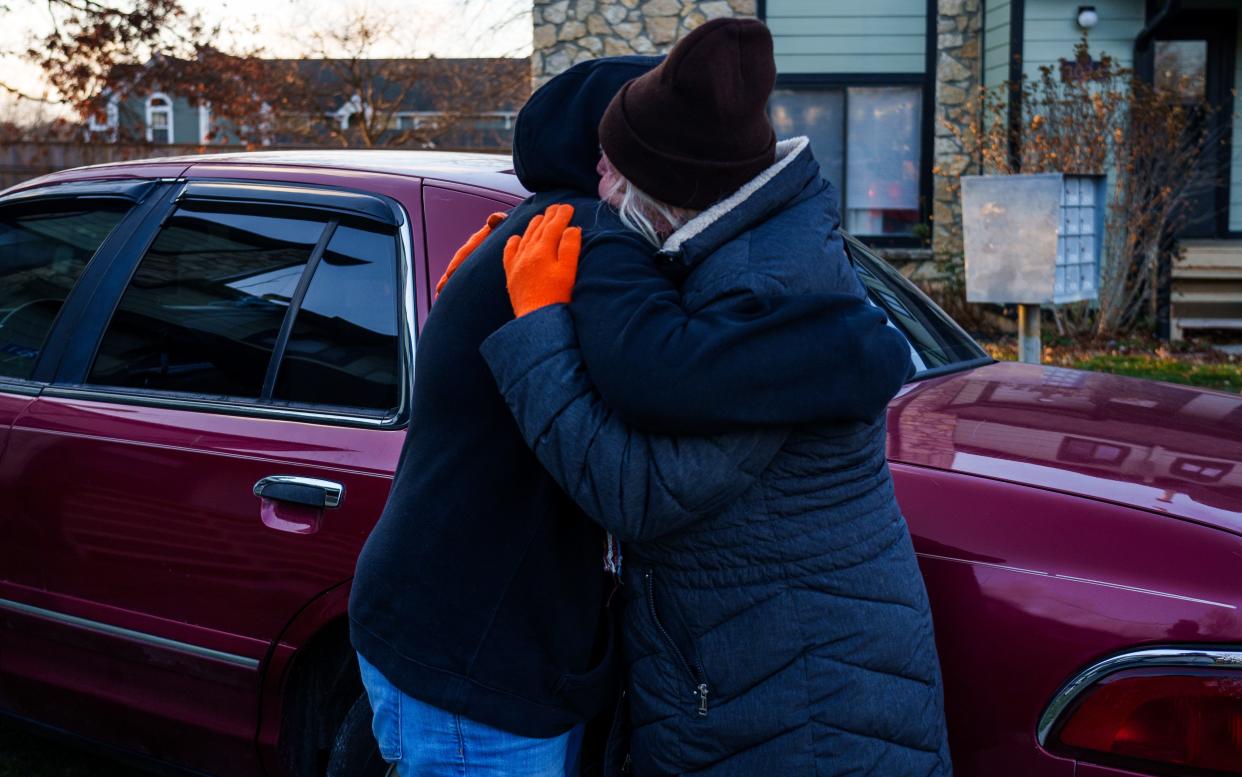
On a cold November Monday when the temperature dipped below freezing, Austin Jensen was sweating in a threadbare white T-shirt. He rushed to move his partner, Reeda Raney, himself, and their three rescue pups out of their westside home by 5 p.m. or be evicted.
He flipped a 100-pound dresser on his shoulder and hauled it down the stairs onto the tailgate of Raney’s mom’s pickup truck. Glenda Dillon, Raney's mother, felt helpless. All she could do was hold the door. She lives in a mobile home park and could not offer them shelter.
What to do if you face eviction: Learn about the law in Indiana
“No mama wants to see her daughter sleep in a car,” Dillon said to Raney. Shivering in 20-degree blustering winds, Raney said she had no idea where they would sleep that night.
In the past year, 27,727 Indianapolis residents have had evictions filed against them, according to the eviction tracking database Eviction Lab. In a city that has the fifth-highest eviction filing rate nationwide, according to the 34 cities tracked by Eviction Lab, the answer to solving Indianapolis’ eviction crisis may come from the very authorities who order the evictions: Indianapolis’ nine townships’ small claims courts judges.
The judge in Wayne Township eviction court, Gerald Coleman, had given Jensen 11 days to move out or be slapped with an eviction, a scarlet "E" that would hurt his chances of finding a home again.
Had Jensen and Raney lived in a different township, they might have had as long as 21 days.
Why are eviction outcomes so different for Indianapolis residents in different areas?
Indianapolis tenants facing eviction can see vastly different outcomes in eviction court, depending on in which township they live.
That’s because Marion County’s court system is the only one in Indiana where township courts have jurisdiction over evictions. Nine separate courts hear eviction cases, one in each of the townships’ small claims courts, each with a different elected judge, each with their own interpretations of the law.
“There are serious constitutional due process concerns when court parties’ rights vary so widely depending on which side of the street the rental property is located on,” Indiana University housing law expert and pro bono tenant attorney Fran Quigley said. "That kind of disparity leaves tenants believing that justice is arbitrary and more connected to the preferences of the judge in front of them than the facts and law that apply to their case."
Advocates, court watchers and tenant attorneys say the vast disparities between Indianapolis eviction courts are confusing at best and unfair at worst.
At one extreme is Wayne Township, where Coleman, as a self-declared matter of practice, usually gives tenants five days to vacate. At the other end of the spectrum is Lawrence Township’s Judge Kimberly Bacon, who gives tenants 21 days. Other courts fall somewhere on the spectrum in between.
Carolyn Kingen, an eviction court watcher from a housing justice task force organized by Meridian Street United Methodist Church, told IndyStar the way that evictions in Wayne Township's court are handed out so speedily seems like a “factory production.” Other judges approach proceedings with what she considered to be more grace and flexibility, such as Warren Township’s Judge Garland Graves who she said almost always inquires about the reason for a tenant being behind on their rent and tries to keep tenants housed.
Other disparities between courts include how quickly an eviction moves through court, whether a judge orders late fees to be waived, and how tenants are treated.
What part do judges play in Indianapolis eviction disparities?
Some township courts offer significant eviction diversion resources and housing navigation help; others don't. Judges also approach hearings differently: in some courts, like Wayne Township, they often only last two to five minutes. In other courts, judges spend triple that time.
The disparities also extend to how likely the judges are to allow eviction cases to be sealed. Sealing a case helps tenants as new prospective landlords won't see the eviction on their record.
Wayne Township had the lowest percentage of eviction cases sealed, 29%, of all eight Indianapolis township courts that had more than one eviction sealing case filed by Indiana Legal Services between Nov. 2022 and May 2023, according to an IndyStar analysis of data provided by the nonprofit. All other townships had eviction sealing rates of above 40%, with all except Perry Township having a rate above 58%.
Each of Indianapolis’ township judges has different practices.
“We do have discretion and I believe that discretion should be exercised appropriately and reasonably,” Coleman told IndyStar. “There's the possibility of abusing discretion too when you go a little bit too far. But that is a question of judgment.”
Coleman told IndyStar that he generally gives tenants five days, more than the state-mandated minimum, because that was the norm in Wayne Township Small Claims Court when he took office in 2015. But he said he may vary how much time he gives tenants depending on their circumstances, such as if a disabled tenant needs more time to move out.
When Bacon took the bench in 2015, the standard was to give tenants five to seven days, she told IndyStar. But, she said, she found that most people who fall behind on rent are unable to recover within that short time.
She started granting tenants three weeks to give people more time to save up, collect one or two more checks from work, pay rent, and stay.
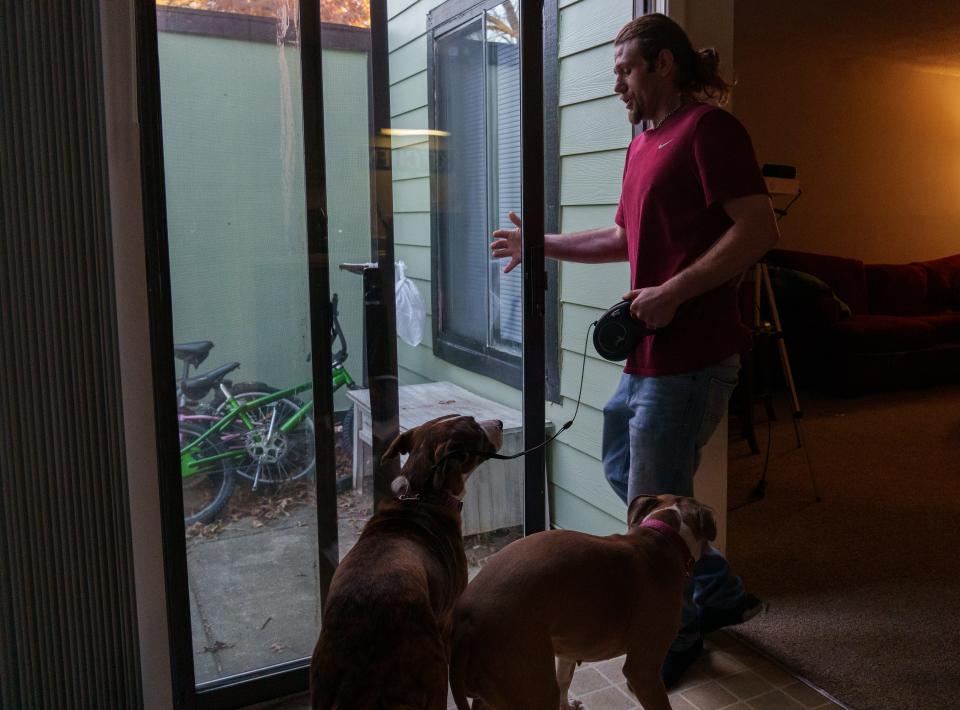
“It is, in my opinion, a bigger issue,” she told IndyStar. “This is the kind of court that can begin a cycle of instability and poverty."
By extending the time a tenant is given to pay their outstanding rent before they have to move out, courts can reduce the number of evictions.
“(W)e want to avoid creating homelessness," Bacon said. "Destabilizing one’s housing can potentially destabilize more than just one individual.”
Raney has never asked for help before. She spent years managing fleets of trucks. She had planned to retire comfortably but her heart had different ideas. Hit with stage four congestive heart failure in 2019, she now relies on $1,400 a month in disability benefits.
She and Jensen had high hopes in October when they moved into the peaceful cul de sac on the westside with a dog park for their pups. But the day after they moved in, Jensen's work doing waste management dried up. The couple fell two months behind on rent. Their landlord filed for an eviction.
The difference between staying in your home and homelessness could be mere days
Indiana eviction law, which some have called landlord-friendly, is notoriously weak in tenant protections. The law only requires tenants be given 48 hours to move out after a judge grants a landlord possession of a property, although the time can be shorter if the case is considered an emergency. Local rules only mandate tenants be given 10 days’ notice between when an eviction is filed and when a hearing is scheduled.
Jensen and Raney had been counting on finding rent money before the court-mandated move out date. But with just 11 days, three of which were holidays when the township trustee’s office was closed, that was not much time at all.
Meanwhile, their car had two broken ball joints that cost $1,400 to fix. They decided to pay for the repairs instead of rent because they needed a car to drive around to find work.
Raney's disability check, which could have helped pay the $3,500 that they owed in rent, wasn’t coming until Friday, four days after Coleman’s ordered move out date.
They applied for rental assistance at the Wayne Township Trustee’s office on Oct. 30 and were denied because they didn’t have the required documents. They were in the middle of an appeal when Coleman ordered the eviction. The appeal failed a week before they had to leave their home.
After the judge ordered them out, the trustee’s office on Nov. 20 offered to help pay for a week’s worth of hotel housing. But the trustee’s office wound up denying them assistance because of a miscommunication between township trustee staff and Raney.
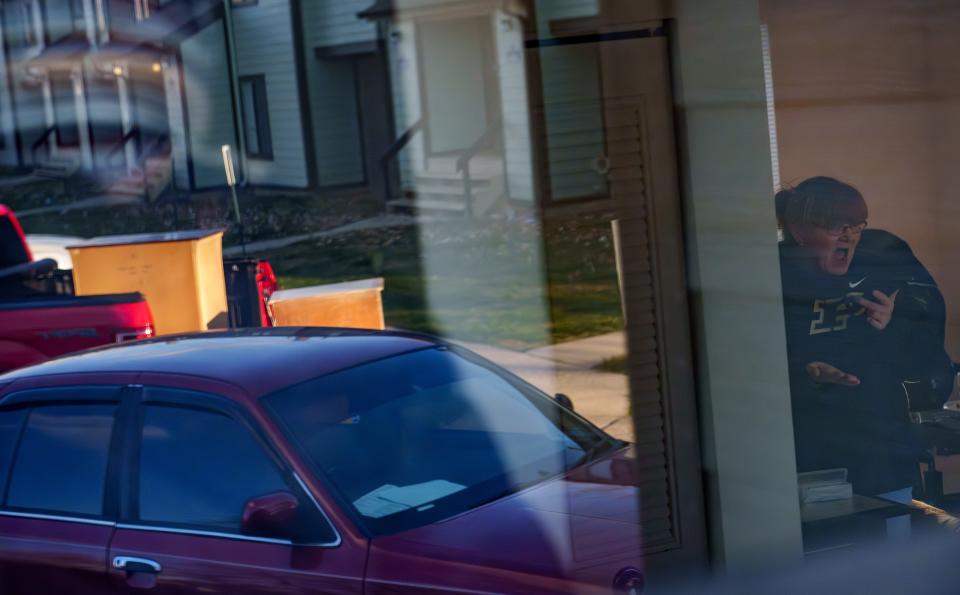
“I have never had to ask anyone for help before,” Raney said. “When I do, I get the runaround....Being poor and being on this side of it, they don’t have a lot of care and concern.”
The same day Jensen and Raney were ordered out, another tenant was evicted in Wayne Township by his landlord who claimed the tenant's name was not on the lease. The tenant, representing himself, insisted he was on the lease but didn’t bring a copy of the lease to court. The landlord, represented by an experienced attorney, had.
“You know you’re coming into court today. You need to bring your evidence,” Coleman said to the tenant.
Coleman added, “If we just gave defendants another day to present evidence, we’d never get through trials.Coleman gave the tenant five days to move out voluntarily or the landlord would be allowed to evict them.
Tenants have vastly different experiences in different eviction courts
Jensen’s hearing in Wayne Township eviction court on Nov. 16 lasted three minutes. Those three minutes would send two lives into a tailspin over the next weeks, if not years.
Over the course of half an hour that Thursday morning, all but one eviction hearing lasted less than five minutes, with one tenant only appearing for 90 seconds before Coleman ordered him out within five days. A hearing for a terminally ill woman in the hospital who had stopped paying rent lasted three-and-a-half minutes. She also got five days.
IndyStar asked Coleman why he often makes final decisions within minutes in an initial eviction hearing.
“Because the law is clear,” Coleman said. “If you’re behind your rent and the landlord requests possession, they're going to get that under the law. There's no need for an initial hearing in that situation. We know what the issues are.”
But some say that there often are deeper issues at play and speedy eviction hearings can violate a tenant's right to due process.
The lightning-fast speed of many eviction hearings, attorneys and court watchers said, stems in part from the tsunami of cases that courts hear on a single day.
On Thursday mornings, the day that Coleman usually schedules eviction hearings, courtroom hallways are crowded elbow-to-elbow.
Quigley said that evictions are incredibly fast and cheap to obtain in Indiana, in part because of how most judges treat the initial hearing, which is the first time a tenant comes to court, as an “all-or-nothing” situation, a “full-blown trial.”
This date can be as little as 10 days after a tenant is first notified of the eviction filing.
“The better practice, and some judges do this, is to treat it as an initial hearing,” Quigley said.
If there is a dispute about whether the tenant is behind on rent or if the tenant has justified reasons for not paying rent, he said, the case should be set for a contested bench trial after the initial hearing.
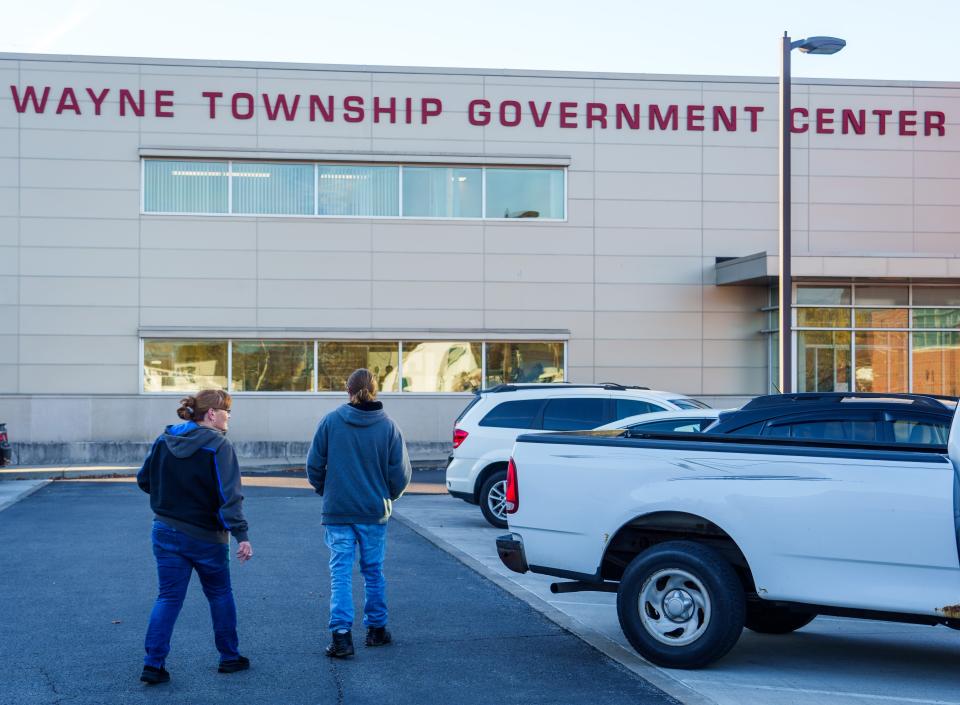
“Pretending that a docket with dozens and dozens if not hundreds of cases on it in a single afternoon is enough time for people to have their rights fully protected is a travesty,” Quigley said.
One housing law expert said she thinks the problem extends well beyond Indianapolis to the entire state's landlord-tenant court system.
"I’m struggling to find words to convey how brutal, inhumane, uncivilized and evil the system is," said Florence Roisman, an Indiana University housing law professor. "It is a collection agency for landlords. It has nothing to do with law or justice. The people who administer it should not be called judges."
A recent Court of Appeals of Indiana ruling illustrates one of the problems. The higher court found that the Center Township Small Claims Court violated a tenant’s due process rights by rushing through an eviction hearing without giving the tenant a chance to prepare and defend herself against allegations.
In the opinion, the court wrote that the case reflected longtime concerns about due process protections in eviction cases.
“A crowded docket does not excuse a small claims court from depriving a litigant of her due process rights,” the opinion read.
Lawrence Township eviction court focuses on eviction diversion
Across the city from Wayne Township eviction court, the day before Jensen was ordered out, Bacon, the judge of Lawrence Township small claims court, was hearing eviction cases. The average eviction hearing that morning was significantly longer than in Wayne Township, lasting 12 minutes.
Before court began, Cheryl Johnson, a court navigator hired by a grant that Bacon obtained in 2022 from the National Center for State Court’s Eviction Diversion Initiative, spoke to tenants about resources available to help them stay in their homes.
“I’m a resource. I help you find resources,” she told the roomful of people.
After court began, Bacon made it clear to tenants that if they deny any of the allegations a landlord made, the case would move to a contested bench trial. Tenants need time to gather their evidence, she told IndyStar, because for many it is their first time in court and they may not understand the process.
“Oftentimes, they are in what I consider a fight or flight mode where they are fighting to maintain their house and may not have had a chance to formulate their thoughts or arguments," she said.
Bacon hired a court facilitator with the grant and said that has also helped improve the eviction dismissal rate.
“Having a resource or somebody to reach out to, to help direct you in the right direction is invaluable," she said.
The Indiana Bar Foundation is providing a grant to six small claims courts to set up an eviction navigation program similar to Lawrence Township's, Bacon said. All township courts except Wayne Township and Perry Township are participating.
Standardizing court procedures around evictions would level the playing field, said Judge Robert Altice of Indiana’s Court of Appeals second district in Central Indiana.
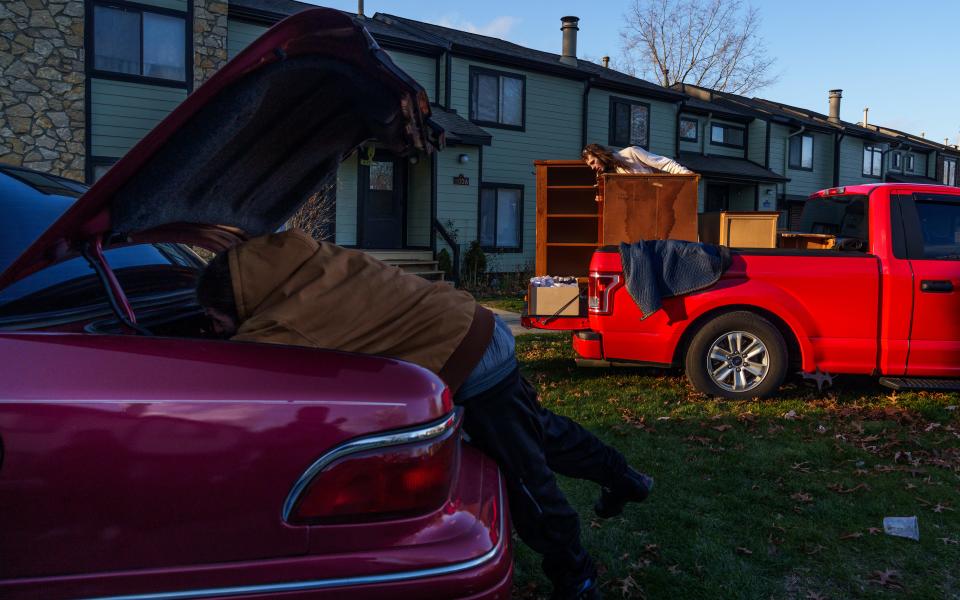
“It tells each of the parties the rules,” Altice said. “It certainly encourages tenants to come into court when they know what the procedure is.”
Moreover, said Altice, standardized rules across courts can prevent forum shopping, the practice of attorneys choosing a court that is thought to be most likely to provide a favorable judgement. The problem, Altice said, is that eviction cases can either be filed in the township court where the rental home is located or Marion County Superior Court. He said that some landlord attorneys who dislike the process in township courts have been filing for eviction in Superior Court because they think those judges might favor them.
“At a minimum, there should be county-wide standards on the timelines for scheduling hearings and the time periods for tenants to move if they are court-ordered to do so,” Quigley said. “Better yet, we should follow the lead of many other metropolitan areas and have a county-wide housing court.”
Marion County courts would have to agree to such a change or the Indiana General Assembly could change eviction laws.
Allen County Superior Court in October 2022 instituted an eviction protocol to ensure judges hearing eviction cases follow similar rules.
The protocol mandates that tenants be notified at least 20 days prior to the initial hearing and that the initial hearing be in person with the landlord, tenant and an eviction diversion facilitator.
Judge Jennifer DeGroote of Allen County, who developed the protocol, said one goal is to reduce the number of evictions by prolonging the eviction process, giving tenants and landlords time to work it out.
Altice, who works as a liaison between Indianapolis' small claims courts and the Indiana Court of Appeals, said that he has been working with the small claims courts to explore how to standardize eviction proceedings.
Coleman said consistency makes sense to a degree.

“It can be confusing when you have same circumstances and different outcomes,” he said.
But, he added, judges' must have discretion to tailor decisions according to each case.
Outside the home where Jensen and Raney had lived, the truck was fully loaded with their belongings, ready to be taken to a 10 by 28 foot storage unit. Raney hugged her mom tightly.
“Not at all how I saw my life going at 49 years old,” she told IndyStar. “But it is absolutely day to day living now."
Raney thinks that they will land on their feet; they always do. They’ve been through tough times before. But that night and for the rest of the week, they had to sleep in their car parked on a dirt road, huddled with their dogs, Riley, Maxwell, and Carly, for warmth.
IndyStar photojournalist Mykal McEldowney contributed reporting. Contact him at mykal.mceldowney@indystar.com.
Contact IndyStar reporter Ko Lyn Cheang on X at @kolyn_cheang.
This article originally appeared on Indianapolis Star: Indianapolis evictions are more common in some parts of the city

